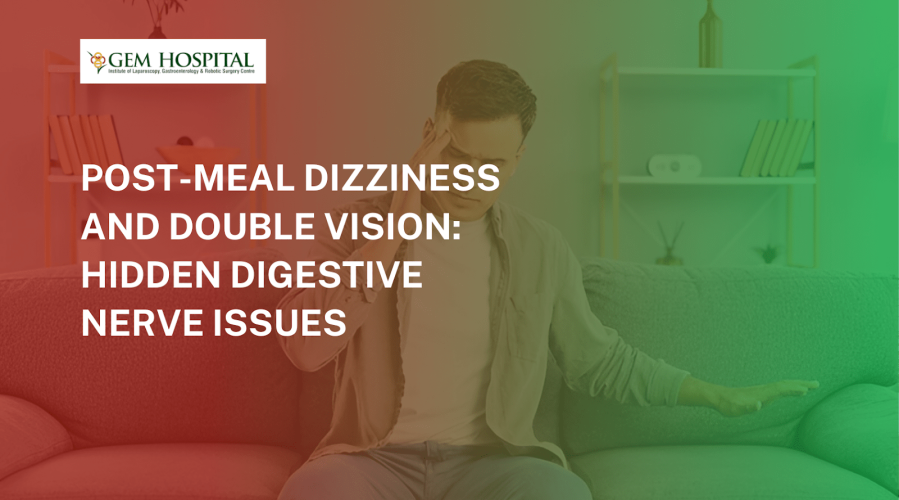Learn what gallstones are, their common symptoms, causes, and treatment options. Discover when to seek medical care and how to manage gallstone complications effectively.
Double Vision or Dizziness After Meals? Rare Signs of Digestive Nerve Disorders

When most people think of digestive disorders, they typically think of symptoms like bloating, heartburn, constipation, or even abdominal pain. However, what if you are seeing double or you feel dizzy, especially after meals? While this may seem unconnected, in rare and specific cases, these could actually point to a more significant issue that has not been identified yet--a digestive nerve disorder.
In this article, we will be looking into the strange but significant signs of digestive nerve disorders, how they affect our health as a whole, and why early diagnosis is essential. If you are experiencing irritating symptoms that seem to not "fit," hopefully, this article can shed some light.
What Are Digestive Nerve Disorders?
Digestive nerve disorders are disorders that specifically affect the nerves that control the gastrointestinal (GI) tract. The vagus nerve is one of the nerves most commonly affected, and is involved in the movement and function of the stomach and intestines in addition to your heart rate and blood pressure.
When these nerves are damaged or "not firing" properly, this can disrupt the normal rhythm and communication of the GI tract, leading to symptoms that affect not just the gut, but the body overall.
Common Digestive Nerve Disorder Symptoms
Most people with digestive nerve disorders experience:
- Nausea or vomiting after eating
- Feeling full quickly (early satiety)
- Bloating or abdominal discomfort
- Constipation or irregular bowel movements
- Unexplained weight loss
- Difficulty swallowing (in some cases)
These symptoms often point to a condition like gastroparesis, where the stomach can’t empty properly due to nerve dysfunction.
However, not all signs are confined to the digestive tract. This brings us to the lesser-known but important symptoms like double vision and dizziness.
Double Vision or Dizziness After Meals – What’s the Connection?
While rare, double vision (diplopia) or dizziness after eating may be linked to certain digestive nerve disorders through indirect mechanisms:
1. Blood Sugar Swings
Digestive nerve disorders like autonomic neuropathy (often seen in long-term diabetics) can lead to unpredictable digestion. This irregular digestion can cause rapid spikes or drops in blood sugar after meals.
- A sudden drop in blood sugar (hypoglycemia) may result in dizziness, blurred vision, or even fainting.
- If the blood sugar spikes and drops too rapidly, it may cause temporary neurological symptoms like double vision.
2. Postprandial Hypotension
This is a condition where blood pressure drops significantly after eating. It happens because more blood is directed to the stomach and intestines for digestion, leaving less for the brain especially in those with autonomic nerve damage.
Symptoms may include:
- Lightheadedness
- Blurry or double vision
- Fatigue or blacking out
3. Delayed Gastric Emptying (Gastroparesis)
In gastroparesis, the stomach doesn't empty properly, causing food to sit longer than it should. This can lead to:
- Nausea
- Vomiting
- Erratic blood sugar
- Dizziness after meals
Some patients even report visual disturbances, which may not be directly caused by the gut but stem from the neurological involvement that comes with nerve damage.
Who Is at Risk?
Digestive nerve disorders can affect anyone, but some individuals are at higher risk:
- People with long-standing diabetes
- Those with autoimmune disorders
- Post-surgical patients (especially stomach or esophageal surgery)
- Patients with Parkinson’s disease or multiple sclerosis
- Individuals with vitamin B12 deficiency or malnutrition
If you belong to any of these groups and are experiencing unusual symptoms after meals, it’s time to look beyond typical digestive issues.
Why These Symptoms Shouldn't Be Ignored
Double vision or dizziness is usually not the first thing you’d associate with digestion. But when combined with other GI symptoms, it could be a warning sign that your enteric nervous system or autonomic nervous system isn’t functioning properly.
If ignored, digestive nerve disorders can lead to:
- Malnutrition
- Poor blood sugar control
- Chronic fatigue
- Mental health issues due to poor quality of life
Early diagnosis and treatment can significantly improve both digestive health and overall well-being.
How Are Digestive Nerve Disorders Diagnosed?
Doctors may recommend a combination of the following tests:
- Gastric emptying study
- Endoscopy or colonoscopy
- Autonomic function tests
- Blood tests for vitamin levels or autoimmune markers
- MRI or CT scan (if neurological symptoms persist)
A multidisciplinary approach involving gastroenterologists, neurologists, and endocrinologists is often needed for accurate diagnosis and management.
Treatment Options
Depending on the underlying cause, treatment may include:
- Dietary modifications (small, frequent meals, low-fat diet)
- Medications that stimulate stomach muscles
- Blood sugar regulation (for diabetics)
- Physical therapy or nerve stimulation
- Vitamin supplementation (especially B12)
In some cases, advanced therapies like gastric electrical stimulation or botox injections into the stomach muscles may be considered.
Don’t Dismiss Rare Symptoms Get Expert Help
If you're feeling dizzy or seeing double after meals and especially if it’s accompanied by nausea, bloating, or irregular bowel movements it could be more than just indigestion.
These may be symptoms of a digestive-affecting nerve disorder, a hidden illness that needs the attention of an expert.
At GEM Hospital our specialists use modern diagnostic tools and customized treatment plans to discover and treat, even rare conditions. If your symptoms are hindering your daily life or you're left asking questions, do not delay.
Make an appointment now with GEM Hospital’s digestive and nerve disorder specialists and take the first step towards clarity and comfort.
Blogs & Article
Learn about bloating and gas problems, including common causes, symptoms, and effective solutions to improve digestion, reduce discomfort, and maintain gut health.
Learn how unverified Ayurveda treatments may cause liver damage, understand the risks, symptoms, and why medical guidance is essential for safe care.


